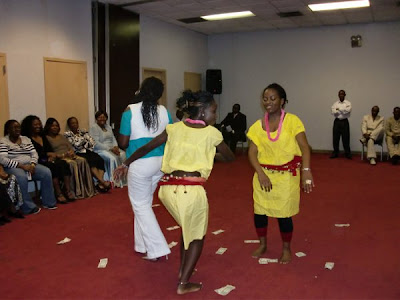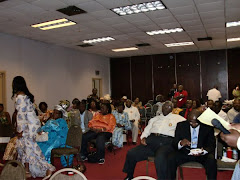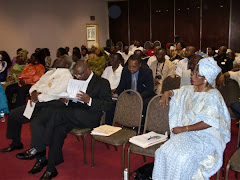
Distinguished Guests
Ladies and Gentlemen
Before I commence my conversation with you today, I would like to call upon you to join me in observing a moment of silence in honor of two departed MECA-USA Founding Fathers: Late Chief Carlet Ayuk-Ako of MECA-DC and late Chief Ernest Tambe-Agbor of MECA-Georgia. Also, on a very personal note, please join me in praying for eternal rest for my dear mother, Princess Sarah Orock Etchu, whom I laid to rest exactly one year ago today in her final resting place in Bachuo-Akagbe.
I would like to extend my sincere gratitude to the Atlanta Truth & Reconciliation Conference Planning Committee for selecting me as the Keynote Speaker. So, who is a keynote speaker and what is his/her role in a critical gathering of this nature? For those who may not be aware, most professional conferences, political events, conventions, and organizational gatherings, typically would select a keynote speaker to not only be the prime speaker at the come-together, but the tone-setter and the person responsible for refocusing the audience on theme of the conference. Knowing how judgmental we Manyu people are, I have decided to speak a little about myself before some of you invoke the Manyu syndrome, “Wo chi aha?” which translates to, “Who are you?”
I am a career Education Administrator with four undergraduate and graduate degrees in Education, International Relations and Information Technology. Since arrival in the USA in 1982, I have been deeply dedicated in being a constructive voice in the issues affecting both the Cameroonian and Manyu communities in the USA. I was a founding member of CAMSA-USA in 1983, and served the organization in numerous capacities such as, Senior Adviser to National Presidents, Chapter President/VP of New England, Committee Chairman and Special Envoy to numerous Presidents of CAMSA-USA.
In the Manyu community, I was one of the six MECA-USA Founding Fathers & Mothers and the Founding Father of the Manyu group in Boston, MA in January 1989, which later became MECA New England - one of the founding chapters of MECA-USA in March 1990. For twenty years, besides being one of its dedicated believers, I have participated in eighteen out of twenty national conventions and the only person to have chaired the most conventions and national events. Lastly, I have served as an Adviser to almost every National Chairman, chaired several committees and been there in attempting to resolve many conflicts our community has faced and continue to experience.
Manyu! Manyu! Now that I have been unmasked, I believe it is the right moment for us to rise up, greet one another, shake hands, hug each other as we start the process of defining why we are here in Atlanta, Georgia today.
Why Are We Here In Atlanta, GA Today?
In case you haven’t yet noticed and/or it didn’t hit you yet, the MECA-USA family is facing its worst and deepest crisis in twenty years. Most of you would agree with me that most families and organizations at some time in their existence do undergo certain difficult moments. However, if any entity, be it a family or organization does not develop adequate mechanisms to successfully resolve its disputes, anarchy in the form of mistrust, disunity and dishonesty reigns. Simply, the group becomes DYSFUNCTIONAL.
My dear brothers and sisters, whether you agree or disagree with my observations, I am here to proclaim to you in the clearest tone possible that MECA-USA, our beloved organization, is an excellent example of a dysfunctional group. We have lived in denial all these while, and today, we are gathered to salvage what remains of our group. This process is called TRUTH & RECONCILIATION. My hope is that at the end of this conference, each participant would disperse from here taking along with them the true meaning of this event, and, of course, putting in to practice some or all of the lessons learned today.
While TRUTH is simply a stated fact, Reconciliation is defined as settlement, resolution, compromise, bringing together. In reconciliation, we MUST take into account the source(s) and cause(s) of the dispute(s), acknowledgment of wrong(s), ability to forgive and exploration of fair and clear avenues to recompense. It is completely untrue to hold the position that reconciliation can take place only between groups or parties. In reality, it is an individual process and exercise which once actualized, then one is confidently and honestly prepared to partake in the general exercise.

Even though some in our community would claim that this conference was a failure because some faction boycotted, I stand here to assure you that such is not entirely accurate. Your presence here today is a huge step in the right direction and future this organization needs at this time. We cannot force unwilling parties on the peace table; however, when the life of an organization is on life support in the intensive care unit, stakeholders interested in unity, love, progress and peace may take upon themselves to build the necessary bridges to connect one another. My dear brothers and sisters, that’s why we are here today.
Where We Came From: Brief History
For a people or community to be strong, they MUST have a rigid grasp, appreciation for and respect of their history. By doing so, they are able to learn from mistakes of the past and capitalize on the successes of past generations. The height of arrogance and dishonesty in MECA-USA today has stood in the path of this noble process. Our individual egos and zealous quest for recognition has done nothing but damage the theme that brought us together in the first place.
Unlike today where Manyu people, food, music and culture is everywhere you turn, the early Manyu immigrant in the USA (1980-1990) starved in search of the things we now take for granted. Especially for some of us who resided outside the Washington, DC and Atlanta metro areas, the sight of a fellow Manyuan and/or the rare occasion to eat some eru, left sweet memories in you for several months. It was that extreme desire to commune, interact and network with one another that ignited the idea to conceive a national Manyu network. Also, in CAMSA-USA (the main student organization), regional alliances became very apparent leaving the politically-aspiring Manyu candidate with very little or no organized network to operate on. Consequently, in the summer of 1988, six Manyu children: Carlet Ayuk-Ako, Sandys Eyong, Elizabeth Nkongho, Esther Abangma, Ernest Tambe-Agbor and Emmanuel Ekumah conceived the idea of a national Manyu organization that would not only serve as a cultural platform for Manyuans in America, but would also provide the political muscle to present a formidable political dominance in CAMSA-USA. In the fall of 1989, a general conference of all Manyuans in the USA was held at the White Oak Towers in Silver Spring, MD. Participated were elated with the concept of a national group. Two delegates were selected from the few Manyu meetings groups that existed at the time (Washington, DC, Atlanta, GA, Boston, MA and Houston, TX). These delegates met in an open general assembly forum in Boston, MA on Saturday, March 31, 1990 and developed the framework for the new organization. On that same day, MECA-USA was born and named after its sister organization in Cameroon, MECA. Atlanta, GA was unanimously selected to host the first national convention. In early July 1990.
Where we went off Track
Like most organizations, MECA-USA has seen its own share of triumphs and tribulations. Over the span of its short existence, we have witnessed some major events that have had a tremendous effect on the stability and strength of our group. From internal chapter splits to chapters sounding a vote of no confidence on the National Executive Committee (NEC), these milestones have either strengthen or weakened us depending on how one sees it. On the other hand, we have been successful in small ways over the years in supporting some development efforts in Manyu.
Manyu! Manyu! The three occasions when extreme intolerance manifested its ugly self so vividly, our organization suffered a huge tremor. First, in Washington, DC, the 2001 Convention when the Joseph Eyong administration connived with the Council of Chiefs (COC)/Electoral Committee to disqualify the candidacy of candidate for National Chairman, Morgan Enowmbitang. That decision ultimately led to the disenfranchisement of certain Manyuans and the formation of another Manyu rival group, the National Organization for Manyu Advancement (NOMA). Failing to learn from mistakes of the past, the COC/Electoral Committee once again reneged on their constitutional responsibilities at the July 2007 Houston Convention by presiding over another fraudulent electoral process that led to a team suing the association. Lastly, in July 2009 Washington, DC Convention, the COC and the Independent Electoral Committee in the grandest of all electoral frauds, collected absentee ballots from almost one hundred Manyuans and attempted to influence the outcome of the 2009 elections. Despite appeals from conventioneers for the absentee ballots to be put through the rigorous constitutional scrutiny as stipulated in the MECA-USA constitution, the COC and IEC overruled. The end result was no election and a subsequent decision by the COC to unconstitutionally appoint the incumbent Chairman for another two-year term. The COC decision was followed by four chapters (Washington, DC, Georgia, Dallas and North Carolina) of the organization denouncing the decision and unwillingness to recognize the NEC.
Areas of Concern:
My dear brothers and sisters, based on my professional experience and participation in this organization, please permit me to honestly pinpoint some of the areas that concerns me the most with our group. I am also very convinced that the mere presence of these negative elements have a resounding effect on our state today:
Dishonesty: Lack of Selflessness
Disrespect: Persons & Institutions
Intolerance & Hate
The Attributes of An Effective Organization: DCOM
DIRECTION: Clear Vision as defined by the Leadership and understood by stakeholders.
COMPETENCE: Ability to articulate and perform tasks. The organization must attract and put in place competent individuals to run its affairs.
OPPORTUNITY: Potential for growth and adequate maximization of human and capital resources.
MOTIVATION: Eagerness to serve and belong. Provide incentives for members to be motivated to serve loyally.
The Way Forward:
- Simple, User-Friendly & Unambiqous By-laws
- Free & Fair Electoral Mechanism
- Effective Structures: Board of Directors, Chapters & Membership clarities
- Effective Project Development/Management Process
- Effective Conflict Resolution Mechanism
To conclude, I would like to wish everyone journey mercies to the respective destinations. Thanks for the honor bestowed on me today and a productive conference to all. God bless.
Long Live MECA-USA
Long Live Manyu Division






.jpg)


.jpg)


.jpg)
.jpg)
.jpg)







